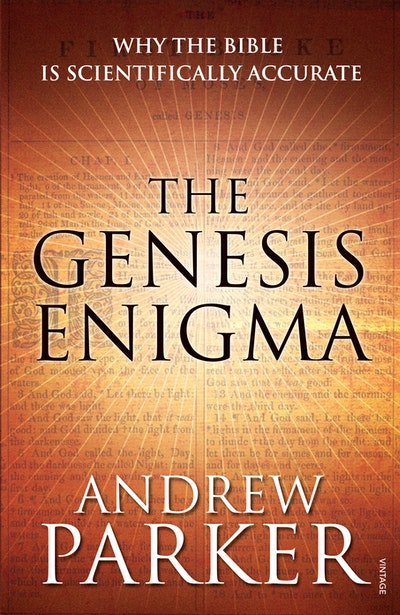- Published: 3 August 2009
- ISBN: 9781741666380
- Imprint: Vintage Australia
- Format: Trade Paperback
- Pages: 336
- RRP: $34.99
The Genesis Enigma
Why the Bible is Scientifically Accurate
- Published: 3 August 2009
- ISBN: 9781741666380
- Imprint: Vintage Australia
- Format: Trade Paperback
- Pages: 336
- RRP: $34.99
Raised without religion, biologist Parker had his curiosity piqued by responses to his book, In the Blink of an Eye (2003), about his major scientific contribution, the light switch theory, which contends that the evolution of vision spurred the explosion of life-forms in the Cambrian period, 520 million years ago. His correspondents suggested that his theory put the final link in place between the account contemporary science gives of the world's development and that related by the first chapter of Genesis. This book is his considered response to that suggestion. Chapter by chapter, he relates the stages of cosmological development and evolution to the seven stages of Creation in Genesis 1, from 'Let there be light' - the concretion of the sun - to the debut of birds, which defied the rule (i.e., the reign) of vision over the cycle of predation on which all life depends (birds are uniquely able to flee predators). Read metaphorically, Genesis 1 is a scientifically sound outline. Each of Parker's chapters, though sprung from a biblical statement, proceeds to chronicle two processes, that of how science thinks the earth and life developed and that of the scientists who forged the theories and obtained the facts that enable and confirm science's account of creation and evolution. Parker, a popular science writer second to none in clarity and congeniality, has given us the single Darwinian bicentenary publication most liable to reconcile religion and science.
Ray Olson, Let There Be Light
When you pick up a book titled The Genesis Enigma: Why the Bible is Fundamentally Accurate, you expect a fundamentalist attack on the theory of evolution, or at least a plea for Intelligent Design theory. In fact, the author, Andrew Parker, believes in evolution. A scientist based at Oxford University and the Natural History Museum in London, Parker is not a Bible literalist, and he dismisses Intelligent Design as a 'concocted theory' characterised by 'flawed logic' and 'forced' theorising. The book describes the remarkable similarity between the order of events described in the first chapter of Genesis and the scientifically known series of macro-evolutionary steps in the history of life on earth. Parker asks how a text written some 2,500 years before the development of modern science could have captured this order of events, and says it was either a lucky guess or a matter of inspiration.
Review
The book is an interesting attempt to make sense of this ancient text: the creation account of Genesis 1 as a combination of divine inspiration with the limited thought- and language-forms of a particular (in this case, scientifically backward) culture. It makes a persuasive case for a deep wisdom behind the words.
Mike Potemra, National Review Online
Reviews of IN THE BLINK OF AN EYE: A bold and compelling theory . . . presented with clarity and subtlety.
Scotland, Sunday
Review of IN THE BLINK OF AN EYE: A brilliant and eminently readable evolutionary detective tale . . . [Parker's] energy and intelligence are undeniable.
Roanoke Times
Review of IN THE BLINK OF AN EYE: A well-written book, containing much really interesting science and a good strong hypothesis.
Washington Post
Review of IN THE BLINK OF AN EYE: An informative work . . . Parker makes a persuasive case that the Cambrian explosion was triggered by the evolution of vision.
Boston Sunday Herald
Review of IN THE BLINK OF AN EYE: I don't think you can find a more reader-friendly introduction to evolutionary biology.
San Jose, Mercury News
Review of IN THE BLINK OF AN EYE: Parker makes a compelling case . . . It's a neat theory.
San Diego Tribune
Review of IN THE BLINK OF AN EYE: Parker provides an insightful glimpse into the mind of the scientist . . . [A] thought-provoking work.
Library Journal
Review of IN THE BLINK OF AN EYE: Parker's conclusion . . . is both convincing and surprisingly fresh . . . cutting-edge science, highly recommended.
Kirkus Reviews
Review of IN THE BLINK OF AN EYE: Parker's thesis is carefully presented, and reads like something of a mystery . . . A valuable and inventive contribution.
Providence Journal



